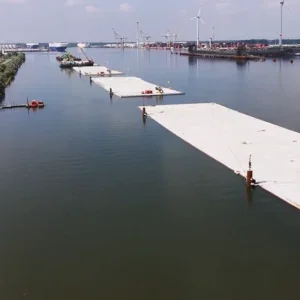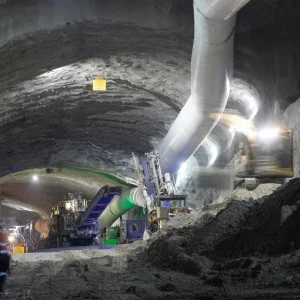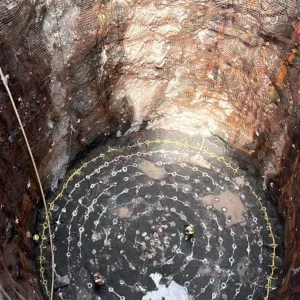Ross McKenzie started his career in academia but ended up in tunnelling and contracting almost by accident. He was carrying out some studies for Taylor Woodrow in connection with a tunnelling project and got bitten by the tunnelling bug.
He joined the Taylor Woodrow tunneling section headed by Colin McKillop and gradually rose to be Director in charge of tunnelling projects in Taylor Woodrow Civil Engineering. He was particularly involved in outfall tunnels for power stations and in his early years he was involved in Fawley, Wylfa, Sizewell and Seaton Carew.
I first met him in 1970 at Hartlepool or Seaton Carew as the station is now called. His team was doing the outfall tunnel and I was about to sink my first big shaft. We really started working together in 1982 on the Piccadilly Line Extension toHeathrow Terminal 4 for London Underground and this was quickly followed by the Channel Tunnel on which we started working in 1984.
I can remember Ross ringing me in my car just before Christmas in 1984 to tell me that it looked as though this time the channel tunnel was going to happen. In 1985 the Channel Tunnel Group (CTG) was formed to bid for the concession to build and operate the tunnel. Ross led the construction planning and pricing that went forward to form the successful CTG bid.
He went on to join the newly formed Transmanche Link (TML) who were the channel tunnel constructors and did all the early planning and procurement of plant and equipment as the project got underway. This included, (for the tunnellers), the introduction of the NATM (little used in the UK prior to this) to achieve the underground development at Shakespeare Cliff. As the organisation expanded Ross took over the responsibility of all engineering for the construction team and remained in that position until the maintunnelling work was completed in 1990.
He returned to Taylor Woodrow and was appointed Director in Charge of tunnelling projects. He got the TW Precast Linings business started and also became responsible for Taylor Woodrow Foundation Engineering. He followed with tunnelling projects such as the Brighton Storm Water Tunnel, the A27 Southwick Hill Tunnel and the Jubilee Line Extension- London Bridge Station.
Ross always tried to introduce innovation into what we did. I think he put the first Dosco in a shield, he always wanted unreinforced linings, he used Hagglund carsas bunkers in the pit bottom to turn round trains quickly and achieve record outputs at Heathrow.
With his Foundation Engineering hat on, he became involved in the STAR Rapid Transit system that Taylor Woodrow was constructing in Kuala Lumpur and commuted on a fairly regular basis to and from Malaysia.
He retired in 1997. Having spent many years commuting between London and Glasgow he was keen to get off aeroplanes and into boats and so bought himself a comfortable well powered boat to do some pottering around the Scottish islands.
But of Ross Mackenzie the man, I remember that he constantly spoke of his love for Scotland and its ways, and would often quote a Scottish expression to encapsulate what he wanted to convey.
He was a great thinker and paid huge attention to detail. He would sketch quite intricate little details on the back of anenvelope or on a napkin and hand it to oneof the engineers to draw up when he came into the office. He actually had a love ofalgebra and really enjoyed calculating the angles and the algebraic functions to examine how tolerances might interact, for example, much to the chagrin of some of the consulting engineers.
He was a man of standards and firm opinions who could come across as stern, but was actually a very sympathetic man who always cared for his staff and could see things from their point of view.
He did have a way with words and had aknack of finding the right balance in expressing thing particularly to our clients. One expression I remember was his requirement for “a robust solution which erred on the side of optimism” when he was putting together a tender.
He had no truck with bureaucracy or politics and despised “the armchair warriors” as he called them, waving his arm in the direction of the main office, who wanted to tie his work up in red tape. But was always responsible and professional and is remembered with affection by his team.
Ross was one of the principal tunnellers of his time and we will remember his ontribution to tunnelling and to his team.
Ross McKenzie







